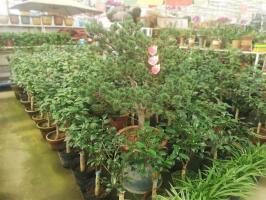Introduction
Pecan trees are widely planted across the United States because of their valuable nuts. However, a common problem that gardeners face is the falling of pecan leaves during the autumn season. As a result, many gardeners wonder if these leaves are toxic to their potted plants. In this article, we'll take a closer look at whether or not pecan leaves are toxic to potted plants.
Pecan Leaves Composition
Pecan leaves are composed of water, fiber, and various minerals and vitamins that contribute to plant growth. These leaves also contain tannins, a type of organic molecule that can help protect against insect and fungal attacks. However, tannins can also act as toxic substances at high concentrations.
Toxicity of Pecan Leaves
While pecan leaves do contain tannins, they are not typically harmful to potted plants, especially when they are used as a mulch. In fact, pecan leaves can be beneficial to potted plants because they help to retain moisture and provide essential nutrients that promote plant growth. However, gardeners should be mindful of the quality of the pecan leaves they use as mulch. Diseased leaves or leaves that have been treated with pesticides can be harmful to potted plants.
Benefits of Pecan Leaves as Mulch
Using pecan leaves as mulch can be a great way to improve the health of potted plants. Pecan leaves break down quickly, releasing nutrients that can help support the growth of potted plants. This natural mulch can also help to regulate soil temperature, prevent water evaporation, and suppress weed growth. However, gardeners should be cautious not to over-mulch, as excess mulch can lead to waterlogging and root rot.
Alternatives to Pecan Leaves as Mulch
If you're worried about the quality or availability of pecan leaves, don't worry. There are other types of natural mulch that you can use to improve the health of your potted plants. Examples include straw, hay, coffee grounds, leaves from other trees, and grass clippings. These materials are affordable, easy to find, and have similar benefits to pecan leaves. When choosing your mulch, be sure to consider the specific needs of your potted plants, as different plants require different types of mulch to thrive.
Conclusion
In conclusion, pecan leaves are not toxic to potted plants and can actually provide many benefits as a natural mulch. However, gardeners should be careful not to use diseased or pesticide-treated leaves, and should also avoid over-mulching. If you can't find pecan leaves, there are plenty of other types of natural mulch that you can use to promote the growth of your potted plants. With proper care and attention, your potted plants can thrive, even with the falling of pecan leaves in the autumn season.

 how many times do yo...
how many times do yo... how many planted tre...
how many planted tre... how many pine trees ...
how many pine trees ... how many pecan trees...
how many pecan trees... how many plants comp...
how many plants comp... how many plants can ...
how many plants can ... how many plants and ...
how many plants and ... how many pepper plan...
how many pepper plan...
































